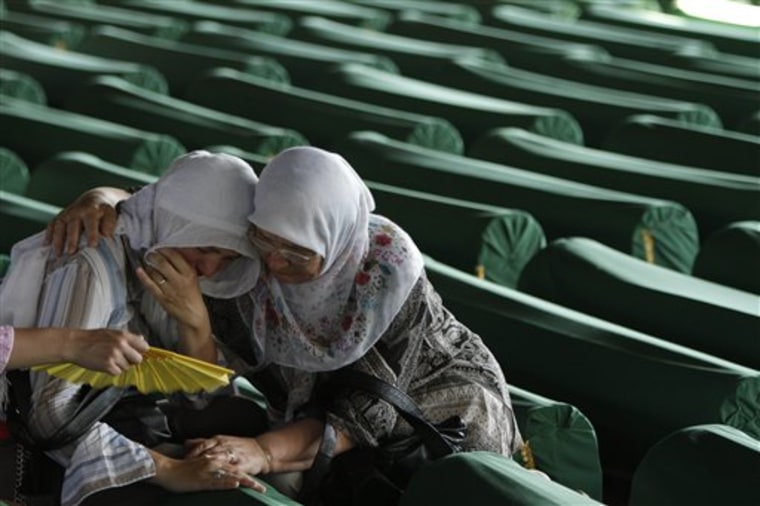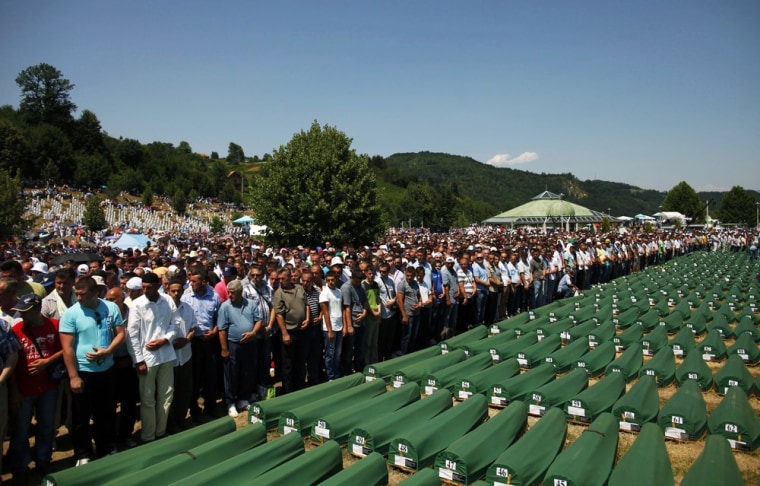They came again, on the 17th anniversary of Europe's worst massacre since World War II, to bury their dead in the town whose name is now synonymous with genocide.
Some 30,000 Muslims traveled to a memorial center in Srebrenica, Bosnia, on Wednesday to bury 520 newly identified victims — the remains of thousands of 8,000 Muslim men and boys slaughtered in July 1995 by Serb forces.
The annual ritual was as heartbreaking as ever.
Izabela Hasanovic, 27, spent the last minutes crying over one of the coffins before it was lowered into the ground.
"My father, my father is here," she sobbed. "I cannot believe that my father is in this coffin. I cannot accept it!"
Another woman dropped on her knees next to a coffin, pressing her lips against the green cloth covering the wood.
"It's your sister kissing you. It's me," she whispered to the coffin, caressing it with both hands until others lowered it.

Then the valley echoed with the sound of dirt pounding on over 500 coffins from thousands of shovels as a voice read out the names of the victims and their ages from loudspeakers.
Among them were 48 teenagers as well as 94-year-old Saha Izmirlic, who was buried next to her son who also died in the massacre. On the other side of her grave, an empty space is waiting for her grandson who has not yet been found.
Srebrenica was a U.N.-protected Muslim town in Bosnia besieged by Serb forces throughout Bosnia's 1992-95 war. Serb troops led by Gen. Ratko Mladic overran the enclave in July 1995, separated men from women and executed 8,372 men and boys within just a few days. Dutch troops stationed in Srebrenica as U.N. peacekeepers were undermanned and outgunned and failed to stop the slaughter.
The bodies of the victims are still being found in mass graves throughout eastern Bosnia. The task has been made even more difficult by the fact that the perpetrators dug up mass graves and reburied remains in other mass graves to try to cover their tracks. The victims have been identified through DNA analysis and newly identified ones are buried at the Srebrenica memorial center every year.
So far 5,325 Srebrenica massacre victims found this way have been laid to rest.
Mladic still a hero
Mladic was arrested last year in Serbia and is on trial now at the tribunal in The Hague. He faces 11 charges, including genocide, for allegedly masterminding Serb atrocities throughout the war that left 100,000 dead, especially the Srebrenica massacre. He denies wrongdoing.
But despite the charges, to many Serbs Mladic remains a national hero.
"Serbs believe he is an honorable and fair man," said Bosnian Serb Novica Kapuran from the town of Pale, near Sarajevo. "He is being blamed for something he has not done."
That attitude angers Muslim Bosniaks.
But Holocaust survivor Rabbi Arthur Schneier of the Park East Synagogue in New York, who came to attend the funeral in solidarity with the victim's families, told The Associated Press that Bosnian witnesses should simply continue testifying and keeping a record.
Schneier said he knows from dealing with Holocaust deniers that "to the advocates of a revisionist history, you cannot even present the facts, because they will not accept them."
The rabbi urged the world to stand up in the face of injustice, "hear the cry of the oppressed and to respond. "
"Silence on the part of the international community ... only strengthens the perpetrators," he said.
In Washington, President Barack Obama issued a statement honoring the memory of the "8,000 innocent men and boys" who were massacred in Srebrenica 17 years ago.
"The name Srebrenica will forever be associated with some of the darkest acts of the 20th century," Obama said.
Obama said the U.S. "rejects efforts to distort the scope of this atrocity, rationalize the motivations behind it, blame the victims, and deny the indisputable fact that it was genocide."
